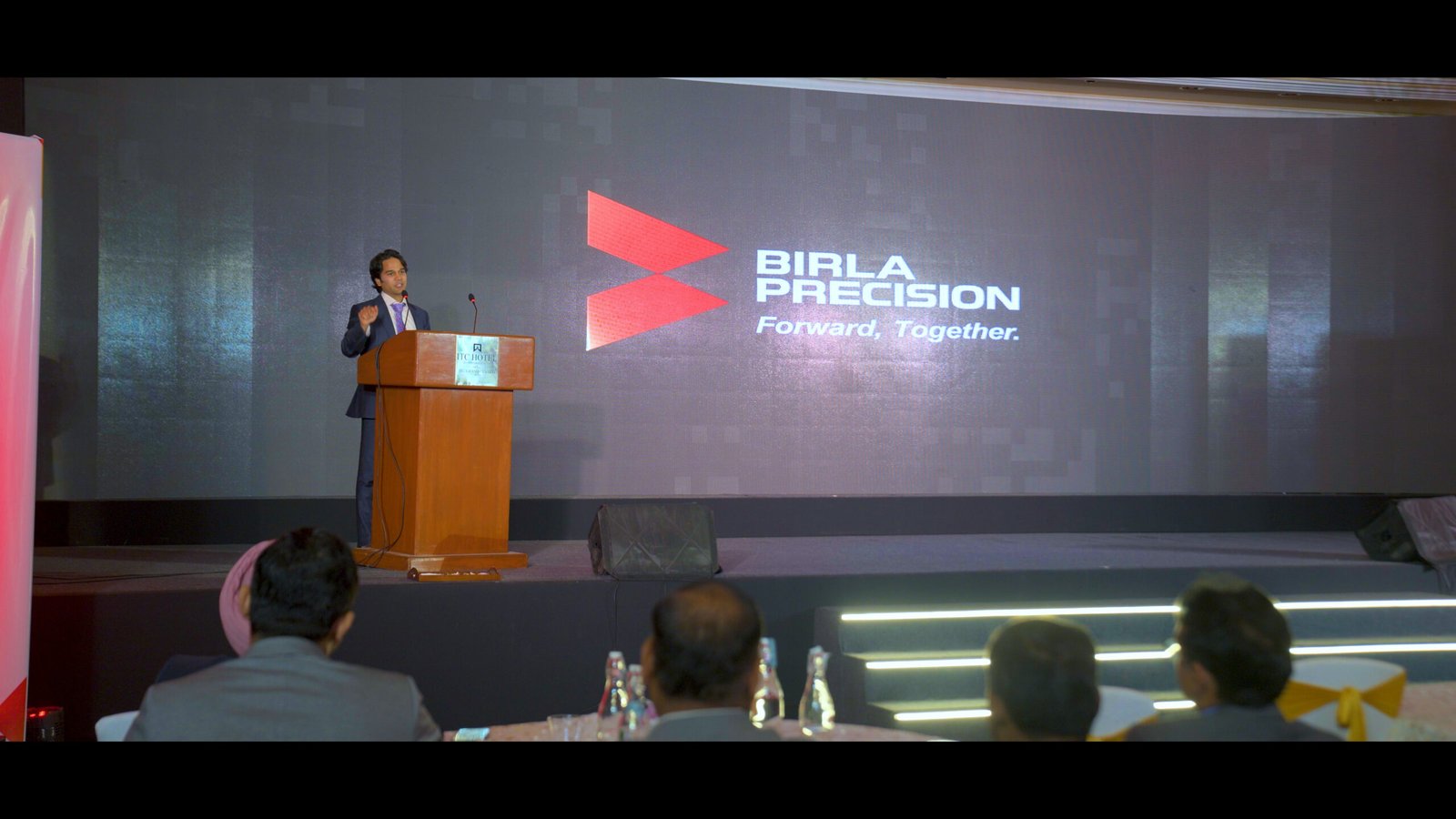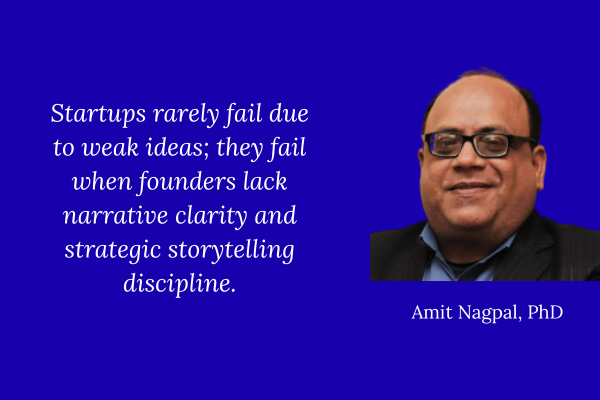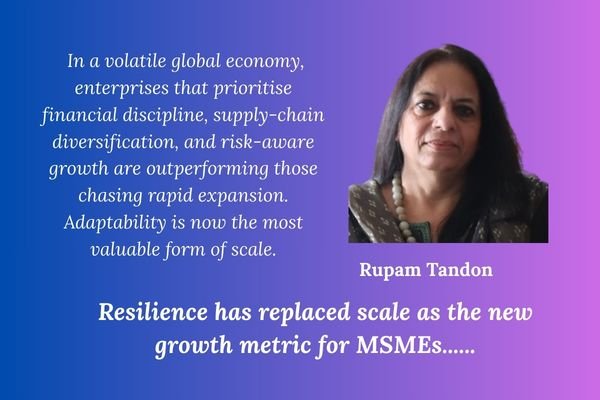Navigating the new normal A post-COVID approach for SMEs
IERD-Global SME News webinar, 27th August 2020, on the topic “Navigating the new normal A post-COVID approach for SMEs”, brought together experts and entrepreneurs from different fields to share their insights on making sense of the new scenario and to help businesses reinvent themselves.
The Covid-19 pandemic has impacted micro, small and medium sized businesses world over.It has caused an unparalleled health crisis with tragic consequences. Businesses have been hit and livelihoods lost for millions the world over, particularly in the MSME sector that represent more than 70% of global employment and 50% of GDP, according to ILO. While the economic crisis that is being experienced is unparalleled in our collective memory, the SME sector need to be resilient.
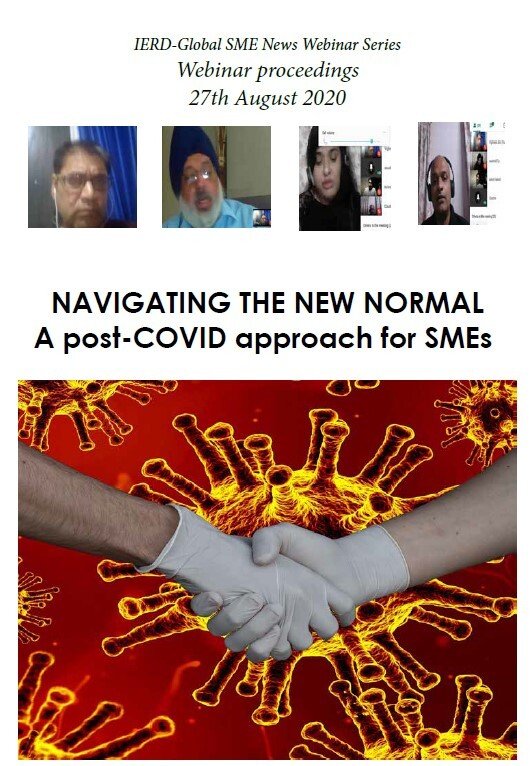
Three experts shared their thoughts on the topic Navigating the new normal: a post-COVID approach for SMEs. Mr. Vignesh Jha, Director, Hum Shilpakar; Mr. K. S Ahluwalia, Founder and CEO, Excalibre; Anita Joseph, digital marketing professional, shared their thoughts and perspectives, which was followed a discussion. Dr.P. Koshy moderated the webinar.
Focus and issues highlighted by the speakers are as follows:
The webinar focus was largely on understanding some of the best practices, approaches, strategies that might help entrepreneurs and Small enterprises remain successful, enhance customer reach, grow their ventures during the time of crisis such as pandemics like Covid-19.
• Making sense of this crisis with an entrepreneurial perspective
• Why and How SMEs reinvent their purpose and mission in the context of Covid-19and the new normal?
• Approach and strategy that should lead them in the new normal
New normal is digitally driven
In his initial remarks, Dr. P. Koshy pointed out that the New Normal is going to be digitally driven. And the pandemic has speeded up digital transformation in a big way. He also highlighted the need on the part of small enterprises to accept the importance of occupational safety and health of the employees in all kinds of businesses. He further added that the new normal is characterisd by significant shift with regard to place of work. Work from home is not just for IT and few other knowledge/technology intensive sectors alone.
Home based manufacturing and revival of rural cottage industry concept are also going to part of the new normal.
Migrant workers returning to their villages can trigger a revival of village cottage industries. With workers returning to their villages from the industrial hubs and cities, they have already restored their previous avatars as artisans, farmer, farm-workers and various agro-farm support solution providers.Weavers, artisans, handicraftsmen, potters and such cottage industries can revive their manufacturing activities. However, they should be provided with digital solutions and tools to market their products and reach out to the affluent markets/customers.
Connecting artisans with the markets
Mr. Vignesh Jha, spoke on the topic maximising rural industry potential. He said, hundreds of traditional arts and crafts have been vanished in the last seventy years, while approximately nine hundred and fifty traditional crafts are on the verge of vanishing as found in a recent research.

These crafts possess capacity to engage many thousand entrepreneurs and workers. What they need is demand for their products. Though these products are aesthetically appealing,colourful and of immense use in our daily lives, these artisans lack appropriate strategy to market and digital platforms to connect with the buyers globally.
In this context, Mr. Vignesh presented a current initiative to connect rural industries, particularly artisans and handicraftsmen to the rest of the world to the urban markets through a digital platform. The digital platform is called Hum Shilpakar, which will help showcase products from rural India to the rest of the world so that those who need them can buy them online.
SMEs need to reinvent themselves in the new normal
Mr. K. S Ahluwalia while speaking on the occasion said that there are no products that cannot be marketed. There is a great potential that awaits SMEs. To be successful enterprises have to innovate, diversify and identify new kinds of products, solutions that the market need. Innovation and reinventing the purpose and goal is key to success in the new normal.

Mr Ahluwalia added that as times and context change, enterprises have to reinvent themselves. New solutions may be needed for the customers. As their tastes and preferences change businesses have to offer customized solutions as well as products to keep up with those changes. Often SME enterprises do not succeed and make money because they are not serious about it. Many of the SMEs being family oriented and managed by the entrepreneur himself/herself.
They often fail to understand the need to work within a professionally manged environment. These enterprises often do not have management systems in places as well as process and procedures not defined. The SME entrepreneur instead of delegating responsibilities continue to do what he likes to do the most. When his or her role remains the same as while they started up long ago, SMEs get stunted. Its therefore critical that SMEs need to have management systems in place.
Often there are no standard operating procedures in place. And indeed, SME owners are not keen on delegating responsibilities and prefer to do everything themselves. Entrepreneurs have to play the role of the lead innovator in an organization. Here they have to think innovatively and his/her teams have to execute the idea after planning and designing steps to be followed. This is critical for success in the new normal.
Leveraging digital marketing for SMEs
Ms. Anita Joseph while sharing her thoughts on leveraging digital marketing potential for SMEs called for SMEs to adopt digital technologies. SMEs need to approach the new normal differently and it calls for a paradigm shift in their approach.
The new normal is going to be so much driven by digital technologies. In the new normal, in order for SMEs to reach out to the targets, there has to be a well designed digital marketing strategy. She said, there is no single one-size-fits-all strategy to boost SME business. It will differ from business to business, product, and demographics so one need to be careful when choosing a strategy.

Now with the pandemic having forced us all indoors and online, we’ve come to realize that digital marketing is much more than just a website. We’ve woken up to the reality that the world is powered digitally and that digital solutions are A MUST for businesses that hope to survive at this critical time. In fact, digital transformation speeded up so much during the covid lockdown and post lockdown days that even SMEs have realized that their survival depends on the kind of digital business solutions that they adopt.
Discussions: Questions, comments and suggestions
How feasible is it for rural artisans to adopt digital marketing solutions?
Ms. Sreekala Nair commented that there has to be way out for rural industries to adopt digital technologies particularly digital marketing tools. She raised a concern that whether, not so much educated rural artisans can adopt digital marketing techniques without technical assistance to promote their products?
To this Mr. Kalesh Prasad, CEO, LiTech, a digital technology company, said that its much easier and simple than we think. There are many easy to learn tutorials available in most regional languages as well. In addition to that social media also offers easy to use tools for rural entrepreneurs and they are already making use of it. Mr. Kalesh, added that many of
his clients from rural India has benefited with such easy to implement modules that he provided for digital marketing.
Mr. Vignesh Jha said with android technology enabled mobile phones, rural entreprenurs can take collect images/videos of their products and post it in facebook or e-commerce portals as per the speciciations very easily, which many are doing already. Also, they can add description in their own language, either type or dictate that get translated into English
or other languages with the in built tools available. Anita added that though its indeed a challenge to offer appropriate digital marketing solutions to rural industries and that is where we must innovate.
Digital divide a major challenge
Dr. Sachin Patil raised a concern that despite many efforts by the government and NGOs to bridge the digital divide, India has several miles to go before digital India becomes a reality. Further, many artisans are not so familiar with mobile technology and lack knowledge and training on using basic ICT tools and technologies.
Connecting artisans with the affluent markets: a major challenge
Dr. Kishore Chatter said that often artisans and rural industries have only limited resources, knowledge, finance and experience. “They have only their bamboo and few products made with those resources”. Though it will be a signicant aspect and mission to connect them with the rest of the affluent markets globally, it will not be that easy to achieve this task. How to market their well-made products; How will they deal with these technologies are all a challenge for them. But how to tide over this crisis is critical for them. If no one buys their products survival will be difficult. They need finance, mentoring as well as critical marketing support.
Shortage of labour in the industrial sector
Mr. Dinesh Hemdev pointed out that unemployment is reaching an alarming level and jobs are shifting from the urban to the rural areas. There is a huge shortage of labour in the industrial sector right now as returned migrants are still not returning back to industrial hubs. In the state of Maharashtra, this year the Ganesh idol makers have very poor sales, many said they couldn’t break even.
Many are saddled with unsold inventories that they will have to refurbish and sell next year. They find it difficult to pay their loans or make ends meet, said Dinesh. Though they are skilful but the craft is dying now and becoming less remunerative as bigger idols are being replaced by smaller ones. The Govt has to help the industry, the artisans and so on. The huge numbers of SMEs simply can’t compete against the large scale Corporates. It’s like Carl Lewis running against an ordinary citizen….Who will win…??
The National Rural Employment Guarantee Scheme gives only 100 days employment @Rs 200 a day, which is not at all-sufficient. Hence, there are deaths caused by poverty and malnutrition. Adding to this are the precarious state of India’s employment, wages, poor living conditions, abysmal healthcare etc.
New ways of delivering products to be explored: Online delivery of fruits and vegetables DM India Case( www.dmindia.org)
Mr. Debobrata Mondal, CEO, DM India, shared his experience. He said immediately after the lockdowns were announced there was a significant spike in demand for vegetables and fruits through his online portal, which he set up one year back. Even people wanted the delivery of groceries and other items. However, he added that finance is still a concern for SMEs and rural industries. From his experience he shared that during the lockdowns, despite his online vegetable delivery business was growing significantly, he found it difficult to arrange finance/loans for expansions.
Growing sectors in the new normal:
IT, ITES, digital marketing, SEO content writing services, E-commerce, agro-tech solution providers, high-tech farming solution consultancies, solar and alternative energy companies are all certain sectors which have grown during the lockdown. They may continue to grow in the new normal. With work from home emerging as a new normal, for stable power supply many are looking for solar powered inverters and energy systems. There is a spike demand for all kinds of digital solutions, products and tools. Li Tech CEO Mr. Kalesh Prasad noted that his firm is now considering to hire more people in order fulfill orders.
Labour shortages impacting the industry
Mr. Ayman Hameed Azeez, Muscat, Sultanate of Oman shared some of the problems that SME sector in the wake Covid-19 led recession. Labour shortage is a major concern now. SME construciton companies had to shed over two million jobs during the economic downturn.
And the sector is struggling to get employment back to pre-recession numbers. Other issues are as follows: Stagnant Productivity Levels; Technology Adoption; Timely cash flow from the client and shortage of resources; Delayed payments. These particular issues got intensified in the wake of Covid and many are affected.
Paradigm shift in the approach of SMEs in the new normal
Mr. C. K Vishwanath observed that a paradigm shift is called for SMEs while they approach the new normal. It should be, because, zoonotic diseases are also part of the new normal. Breakouts of zoonotic diseases can be more frequent in the days ahead, but societies and businesses have to operate and function within the context of such future pandemics. Viruses and diseases may break out and SMEs have to give due consideration to these issues. And he noted that Rural industries are facing hardships due to this pandemic. The traditional village structure has disappeared, in the context of new normal appropriate institutions need to come up that support SMEs. The platform that Mr. Vignesh Jha suggested, called Hum Shilpakar has lot of relevance. We will have to have innovative ideas for developing the rural economy, which small industries can contribute a lot.
Mr. George Joseph, a former banker from Trivandrum Kerala, highlighted the importance of these suggestion to peculate down to the rural artisans.
Summing up:
In his concluding remarks, P. Koshy said that the new normal that emerges has to be inclusive and sustainable. There has to be a level playing field for all players within the larger SME community. Both the technology intensive SMEs, rural cottage industries as well as informal sector enterprises should have their respective share of market remain intact. However, weathering the crisis calls for forming informal groups and developing self-supporting mechanisms in various aspects, consisting all the stakeholders, that helps foster business resilience. As many of us are in the SME sector, we can all learn from each other, from our successes and failures.

Innovation, Diversification, identifying new solutions that the market needs, New ways of delivering products and services are critical aspects that determine the success and growth of enterprises at all times, particularly at this moment.
What matters most to weather the crisis is the right kind of solutions that we offer. The key here in this context is offering right kind of solutions to the customers. Those entities that innovate and created relevant products, services and solutions for the market have all grown.Despite all the crisis certain SME segments are doing really great. For instance, IT companies, E-commerce, agro-tech solutions that offer farm technology solutions to farmers, solar and alternative energy solution providers, digital marketing, training and education providers are all examples.
Author Profile
Latest entries
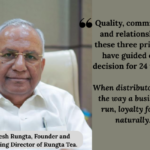 Business2 January 2026Rungta Tea Marks 24 Years with 92% Distributor Retention, Outlines Ambitious Expansion
Business2 January 2026Rungta Tea Marks 24 Years with 92% Distributor Retention, Outlines Ambitious Expansion Business18 October 2025Start Your Drone Business: Aquiline Drones Franchise Program for Veterans
Business18 October 2025Start Your Drone Business: Aquiline Drones Franchise Program for Veterans Doing business3 June 2025India’s Q-Commerce Growth Underscores Market-Driven Innovation: Siddharth Shankar
Doing business3 June 2025India’s Q-Commerce Growth Underscores Market-Driven Innovation: Siddharth Shankar Business15 May 2025World MSME Day: A Global Commemoration of Entrepreneurial Vitality
Business15 May 2025World MSME Day: A Global Commemoration of Entrepreneurial Vitality
